Hats Off to 2007's Top Teachers
Academic divisions honor their own with Alumni Association
Excellence in Teaching Awards
By Contributing Writers
Special to The
Gazette
A pony-tailed epidemiologist who can make a Friday
afternoon class fly by, a devoted engineering professor
with a penchant for field trips and a political scientist
who just loves to hear his students talk are just a
sampling of the outstanding Johns Hopkins faculty whose
teaching talents have been recognized with a prestigious
award.
Since 1992, the Johns Hopkins Alumni Association has
annually recognized university faculty who excel in the art
of instruction with its Excellence in Teaching Awards. The
award allows each academic division of the university to
publicly recognize the critical importance of teaching. The
nomination and selection processes differ by school, but
students must be involved in the selection.
The $2,000 provided to each school by the Alumni
Association can be given to one winner, shared by up to
four or attached to another, divisional teaching award.
The following faculty members are recipients of the
2007 Alumni Association Excellence in Teaching Awards.

BLOOMBERG SCHOOL OF PUBLIC
HEALTH
Homayoon Farzadegan, Epidemiology, small class
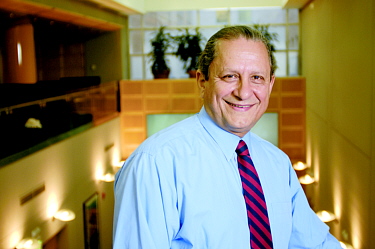
Homayoon Farzadegan, Public
Health
Photo by Will Kirk / HIPS
|
It's a rare teacher who can hold his students'
attention in a class that meets late Friday afternoon. But
Homayoon Farzadegan, professor of epidemiology at the
Bloomberg School of Public Health, is up to the task.
"The time of the class on Fridays was awful, but he
kept it really interesting," said Zunera Gilani, a student
this year in Farzadegan's Epidemiology and Natural History
of Human Viral Infection. "He's such a warm and genuine
person and just made the class fun to be in."
Farzadegan's abilities to engage students —
sometimes under less-than-ideal conditions — earned
him the Golden Apple, as the teaching award is known at the
school, in the best small class category.
"I strongly believe in stress-free learning," said
Farzadegan, who won his first Golden Apple in 2002. "My
teaching philosophy is to provide a relaxed environment to
diffuse knowledge and exchange ideas."
On the faculty since 1985, Farzadegan is an easily
recognizable figure around the Bloomberg School's Wolfe
Street building, with his grayish hair pulled back in a
short ponytail. A native of Iran, he first came to the
United States in 1969 to complete his graduate studies,
then taught at Tehran University School of Medicine. He
emigrated to the United States in 1980, following the
Iranian revolution in 1979, and became a U.S. citizen 18
years ago.
Besides Epidemiology and Natural History of Human
Viral Infection, which earned him the Golden Apple,
Farzadegan's annual course load consists of the Public
Health Impact of HIV/AIDS, Advanced Topics on Controls and
Prevention of HIV, and Applied Aspects of Cohort
Studies.
Farzadegan and Keerti Shah, professor of molecular
microbiology and immunology, developed the Epidemiology and
Natural History of Human Viral Infection course in 1999 and
taught it together. The course covers the biology,
epidemiology and progression of diseases caused by human
viruses. Since 2002, when Shah cut back on his teaching
schedule, Farzadegan has taught the course solo.
He augments his course lectures by opening his
classroom to a "parade of experts" from Johns Hopkins'
various schools and centers to talk about their work in
human viral infection and epidemiology. He also has
students get together in small groups to review the latest
literature and findings on a selected topic and lead a
class discussion.
Often, Farzadegan draws on the expertise of his
students, some of whom have impressive resumes in public
health. An MPH student from India talked to the class about
working on HIV prevention programs there. Another student
discussed her research on HIV and malaria co-infection.
"I learn a lot," he said. "And I'm sure that students,
by exchanging their ideas and opinions, learn a lot,
too."
In addition to his teaching duties, Farzadegan has
been involved in HIV/AIDS research for more than 25 years
in two of the oldest and largest ongoing cohort studies on
the disease — the Multicenter AIDS Cohort (MACS),
which began tracking the occurrence and consequences of HIV
in a group of homosexual and bisexual men in 1984, and the
AIDS Linked to the IntraVenous Experience project (ALIVE),
for which Farzadegan oversees the virology component. The
study has followed HIV progression in injection drug users
since 1988. He also designed the school's first biosafety
level 3 lab for work with potentially lethal infection
agents.
"In research, what I gain is relatively narrow in my
area of expertise, but when I teach, the horizon is
expanded," he said. "That's why I look forward to going to
class." — Jackie Powder
Clive Shiff, Molecular Microbiology and Immunology,
small class
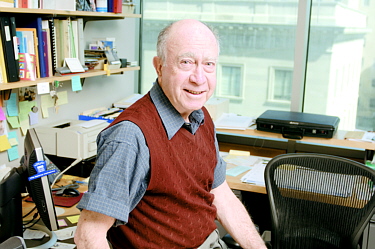
Clive Shiff, Public
Health
Photo by Will Kirk / HIPS
|
Among Clive Shiff's many gifts is one of
understatement; asked to explain the appeal of Biology of
Parasitism, one of two courses that he teaches cited in
this year's Golden Apple teaching award, he offers a
bemused smile. "Well, I've got a fair amount of experience
with parasites," he says, "so I fit nicely with the
subject."
In fact, Shiff, spent close to 30 years
working as a field biologist and medical entomologist in
the ministries of health and agriculture in the former
Rhodesia (now Zimbabwe), where he was born and raised.
Today he's an internationally known malaria expert and
associate professor in Molecular Microbiology and
Immunology at the Bloomberg School of Public Health —
and a two-time Golden Apple honoree. He last won in
1990.
Shiff left Rhodesia in 1979, during the
country's tumultuous transition to an independent Zimbabwe,
and began his teaching career at UCLA. He arrived at Johns
Hopkins in 1986 but returns to Africa at least twice a year
to visit the malaria research station he helped found in
Macha, in rural southern Zambia. The center is not far from
the Zimbabwe border, and his beleaguered former homeland is
never far from his thoughts: On his office wall hangs a
vintage postcard of Zimbabwe's capital city of Harare, its
serene streets lined with blooming jacaranda trees. "I'm
third-generation African — that's all I know," he
says. "I feel completely invigorated whenever I go
back."
His deep background in the region
provides vital material for his teaching. He developed
Tropical Environmental Health, a two-unit course, to take
advantage of the work he once did as a government health
official creating efficient pit latrines and water pumps
for use in remote villages. When it comes to parasitology,
there are few African bugs that Shiff has not encountered
over the course of his career. "That's the beauty of having
field experience," he said. "You can use personal
anecdotes. I come from there, so I know what people are up
against."
With his droll manner and courtly
accent, Shiff makes a charming tour guide, but the emphasis
is on practical advice. His courses draw a diverse
assortment of students, from Peace Corps veterans to
engineers, and he frequently receives letters from former
students who employ his teachings in the field. "It's
interesting to see the reverberations," Shiff said. "It's
nice to know that at least some of these principles are
useful."
Inspired by a former chemistry
professor who could weave beautifully structured lectures
from notes scribbled on a pack of cigarettes, Shiff works
without written notes, and his courses emphasize student
participation. "In a small class you have plenty of time to
interact with the students," he said. "That's the best
aspect — you can really get to know them."
He also believes that sometimes the
best teacher can be another student. "I try to get students
to talk about their own experiences," he said. "It gives
the others an opportunity to see what might be in store for
them." — David Dudley
Sharon Krag, Biochemistry and Molecular Biology, medium
class
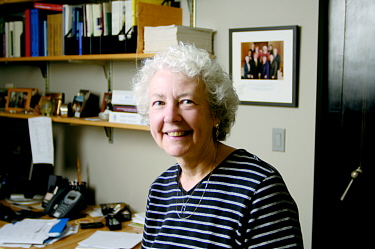
Sharon Krag, Public
Health
Photo by Will Kirk / HIPS
|
For Sharon Krag, the Bloomberg School's associate dean
for graduate education and research, the Golden Apple
couldn't have been sweeter.
When Krag retires next month after more
than three decades at the school, she leaves behind a long
and substantive list of accomplishments in teaching,
administration and research, but until this year the
school's annual teaching award had eluded her.
"It's funny," said Krag, professor in
the Department of Biochemistry and Molecular Biology. "I
was thinking about four or five months ago, 'Well, I'm
going to retire, but I'll never win a Golden Apple.'"
But it turns out that Krag wrote
herself off too soon. When the 2007 awards were announced
last month — two and a half months before her
retirement — she was among the winners.
"It feels spectacular. I couldn't be
more excited," said Krag, who, despite winning the 2002
Stebbins Medal — one of the school's highest honors
— for her contribution to the teaching program,
wanted to retire with a Golden Apple. "The Stebbins Medal
is given by the faculty," she explains. "What makes the
Golden Apple extremely special is that it's from students.
It's their feelings coming out."
The award recognized Krag's course
Public Health Biology, designed to provide students with an
understanding of the biology of infectious diseases,
inherited diseases and cancer, as well as how these
diseases affect populations in terms of public health.
Other courses developed and taught by Krag, who joined the
faculty in 1976, include Biochemistry, Molecular Biology of
Disease, Research Ethics and Public Health Perspectives in
Research.
As a professor, Krag says it's
important to her to engage students in discussions, a
challenge in a course like Molecular Biology of Disease,
which typically numbers between 50 and 70 students.
"You have to walk around, and you have
to make eye contact," she said of her teaching style. "You
have to enjoy interacting with students in order to pull
that off."
Named associate dean for graduate
education and research in 1992, Krag is responsible for the
PhD, ScD and ScM programs and oversees research compliance
in general, including the school's Human Research
Protection Program, animal research, export controls and
issues related to scientific misconduct. Since her
appointment, she has kept up a punishing workload,
continuing her teaching and research, which currently
focuses on maximizing N-glycan occupancy in therapeutic
glycoproteins.
Now, "I'm ready to do other things,"
she said. "To me, this is a 24/7 profession, and so in the
last third of my life — and I intend to live for 40
more years — I want to do whatever the hell I want to
do," Krag said. "I want to read all those books that I've
bought and never had a chance to look at. I want to write a
couple of books. I'm very interested in bringing science to
the lay public. I especially want to spend more time with
my family, and I want to do my birding and anthropology."
Krag's last day at the school is June
29. When asked what she will miss the most, she doesn't
hesitate. "Oh, the people — my colleagues, the
students, the staff. It's just the people." —
Jackie Powder
Leon Gordis, Epidemiology, large class
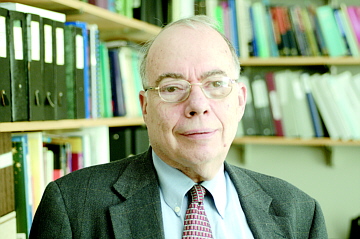
Leon Gordis, Public
Health
Photo by Will Kirk / HIPS
|
One might think that Leon Gordis would have mastered
Principles of Epidemiology by now. Not only has the veteran
professor taught the course for more than three decades,
giving generations of students their official introduction
into one of medicine's core disciplines, he also wrote the
book: His Epidemiology, now in a recently updated third
edition, is one of the field's essential intro texts.
Still, Gordis isn't phoning it in yet. "Even after all
these years, I spend hours on every lecture," he said. "You
have to have a little anxiety, a little adrenaline. If you
get too comfortable up there, that's a bad sign."
A senior faculty member at the
Bloomberg School of Public Health and a professor of
pediatrics at the School of Medicine, Gordis first took the
stage for "Epi 1" in 1974, when longtime chairman Abe
Lillienfeld suffered a coronary while teaching the class
(he was revived by students) and Epidemiology faculty
scrambled for an emergency substitute. "No one else had
taught it before," he said. "There was a tremendous amount
of anxiety." The next year, Gordis, then department chair,
officially inherited the big 8:30 a.m. class. It's a
required rite of passage for most Public Health students,
and enrollment has sometimes swelled to more than 400.
"Back when we were in the East Wing auditorium, they
weren't even in the same room," he said. "You could only
fit about 230, so we ran overflow rooms."
From a teaching perspective, engaging
this vast and sometimes drowsy crowd can be difficult.
Recent curriculum changes mean only about 175 students are
currently enrolled for Gordis' class — a
comparatively intimate gathering by historical standards
— but the professor's strategy remains the same. "I
try to read their faces," he said. "And I try to be
interactive, even with large groups. I pause a lot to let
them ask questions. The challenge is learning to wait
— one has a tendency to just forge on."
An informal question period with
students after every class also helps personalize the
multitude. The course has changed location several times
over the years, but Gordis prefers the older facilities
over the newer halls, with their stadium-style seating and
stage lighting. "It changed from being a place for a class
to a place for an audience," he said.
Also in flux is the course content,
which needs to reflect the present state of the field. The
study of populationwide disease incidence and prevalence
has seen dramatic developments over the decades, and Epi 1
has kept pace. "I always bring in new material," said
Gordis, who notes that teaching also helps him keep his
textbook updated. "You learn a lot from your students.
They're very insightful. And you can't have a better milieu
for it than here."
Obviously, the respect is mutual: This
year, Gordis pockets his sixth Golden Apple. "It's nice
when you hit 72 and people still remember your name," he
said. — David Dudley
Edyth H. Schoenrich, Health Policy and Management,
Internet class
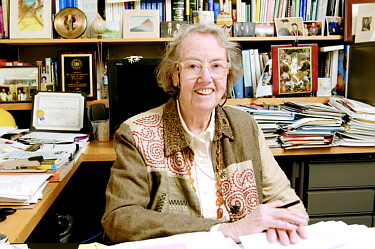
Edyth Schoenrich, Public
Health
Photo by Will Kirk / HIPS
|
Edyth H. Schoenrich is trying to figure out how to
slice up a Golden Apple. This month, Schoenrich will
receive her first Golden Apple for Current Issues in Public
Health, an Internet-based course. But she insists that she
does not deserve the entire award.
"This class is a collaborative effort,"
said Schoenrich, a professor in the Bloomberg School's
Department of Health Policy and Management. "Slices belong
to all of the faculty members who have shared their
knowledge and wisdom, to the extraordinary teaching
assistants and to the technology support staff. Two factors
have strongly contributed to the success of this course.
One is the quality of the presentations made by the
faculty. The other is the hunger of our Internet students
to be more closely involved in the intellectual life of our
school."
Current Issues in Public Health is
offered from September through May during four terms, each
of eight-week duration. Every two weeks, a faculty member
records a presentation that is uploaded onto the Internet
for the students to download at their convenience. The next
week, that faculty member participates with Schoenrich and
the teaching assistants in a live talk with the students.
Students can also, at any time, communicate through online
bulletin boards.
An expert in clinical education and
practice in internal medicine and general preventive
medicine, Schoenrich is also director of part-time
professional programs and associate chair of the Master of
Public Health Program.
Her motivation to teach the course is
related to personal experience. Schoenrich received her
master's in public health from Johns Hopkins in 1971, while
she was working full time for the Maryland State Department
of Health and Mental Hygiene. "I remember leaving work each
day, catching a bus, dashing into the school to listen to a
lecture and then immediately leaving to catch a bus back to
work," Schoenrich said. "So I have a special understanding
of the difficulties part-time and Internet students face.
They don't have the same access to academic resources and
to the intellectual life of the school that full-time
students receive when they personally interact with their
classmates and instructors. I wanted to open these
opportunities to our Internet students, who are spread all
over the world."
Current Issues in Public Health is
unique in that it isn't a required class for any particular
program of study, and students earn just one credit toward
their degrees. "For prospective students, the course allows
persons to explore options for a future in public health,"
Schoenrich said. "For matriculated degree candidates, it
broadens the perspective of persons who are committed to
improving the health of the world's people and the
environment in which they live." — Kenna L.
Lowe

CAREY BUSINESS SCHOOL
Robert Rajewski, Real Estate
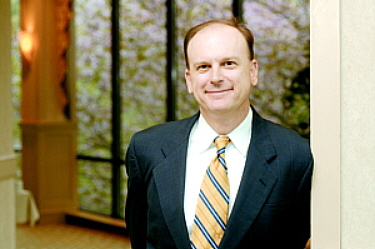
Robert Rajewski,
Business
Photo by Will Kirk / HIPS
|
Bob Rajewski talks of how his degree in real estate
from Johns Hopkins opened doors for him, including the one
that brought him full circle, back into the classroom.
A member of the Edward St. John
Department of Real Estate practitioner faculty since 1996,
the year after he received his master of science in real
estate degree, Rajewski couldn't wait to share his Hopkins
experience with others in an academic setting. He teaches
in both the part-time program and the full-time offering,
the first such program of its kind in the Carey Business
School.
"I always promised myself that I would
give back to the industry on a frequent basis, when I had
the chance to do so," said Rajewski, who manages a
portfolio of 24 assets for a financial institution in
Baltimore. He credits an instructor with providing the
spark to teach. "Shawn Krantz, a fellow teacher, brought me
into the program as a spot instructor, and that led to my
present teaching duties," Rajewski said. "He instilled in
me a sense of teaching that lasts to this day."
Rajewski teaches Real Estate Analysis I
and II, and the Real Estate Practicum, a course that he was
instrumental in creating. The practicum functions as the
capstone course, where students put their newly acquired
knowledge and skills to the test in working on an actual
real estate or development project. Projects vary widely.
"Some students analyze a real estate investment, in theory
'buying' a property; others look at the capital markets, or
zoning regulations, or the buying and selling of commercial
property," he said.
Students' needs and interests differ
significantly as well. "Full-time and part-time students
have different sets of needs, so we customize lectures and
materials as much as possible," he explained. "Our
full-time students average around 23 to 24 years of age,
while our part-time students skew older, in their mid-30s.
Whereas the older students tend to bring more experience
into the classroom, the younger ones may be more familiar
with newer practices and technological tools, so it's an
interesting contrast."
Rajewski sees two major developments
occurring in the real estate industry. The first, he says,
is that the discipline is far more integrated into the
capital markets, demanding a greater understanding from
students of these markets and how they function; the "back
of the envelope" approach to analyzing transactions, he
says, is long gone. The second is that the industry finds
itself in the middle of an economic cycle, the first of its
kind since the mid-1980s. "If a market correction occurs,
it could pose a challenge in maintaining a return on
investment with an acceptable risk, whether you're a
lender, appraiser or owner," he said. "That's a real
challenge my students not only can learn about but see
happening for themselves."
Mike Anikeeff, professor and chair of
the Department of Real Estate, said, "Bob Rajewski has used
his professional experience and teaching talent to create a
new class unique to real estate academic programs in the
country. He makes a tremendous contribution to the success
of the real estate program here at Johns Hopkins."
— Andrew Blumberg

KRIEGER SCHOOL OF ARTS AND SCIENCES
Matthew Crenson, Political Science
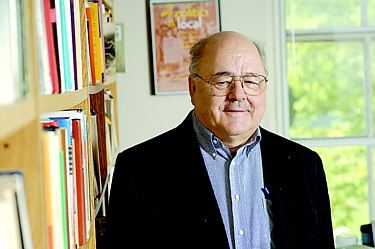
Matthew Crenson, Arts and
Sciences
Photo by Will Kirk / HIPS
|
Krieger School Excellence in Teaching Award
co-recipient Matthew Crenson doesn't follow a particular
teaching philosophy. But he does have a mantra of sorts:
Always overprepare for class. Having several conversation
starters at the ready in advance of his courses in urban
politics makes him more confident that a class meeting will
be sparked with debate.
"I hate dead air, and sometimes it's
hard to get students to talk," Crenson said. But when they
do talk, that's about as good as it gets for a professor, a
lesson he learned while working with a mentor, Francis
Rourke, a political scientist who had joined the Johns
Hopkins department in the 1950s. Crenson also channels
Maurice Mandelbaum, the professor of philosophy who taught
the first big lecture class that Crenson took as an
undergraduate at Hopkins. "Today when I lecture, I find
myself using his turns of phrase," he said.
Crenson, who is set to retire on June
30, has ventured into mentor territory himself, according
to the students who nominated and voted for him.
"Throughout my four years here, I have
had many inspiring professors and am grateful to all of
them, but Dr. Crenson has inspired me and other students to
be an asset to the community and city in which we live,"
one senior wrote. "If I were asked by a prospective
student, who can I talk to about making a difference, I
would send that student to Dr. Crenson."
"He is an embodiment of the university
motto, 'Truth is Freedom,' one whose efforts have resulted
in the original research on his part and the part of his
students that explores the truth about his native
Baltimore," another student wrote. "His tireless effort at
his duties as a professor in the Political Science
Department have affected for the better all the students,
politicians and journalists who over the past several
decades have sought and received his aid."
The Crenson legacy includes his
mentorship of a new group of students as the lead faculty
adviser for the university's Baltimore Scholars program. As
a Baltimore native and former undergraduate himself,
Crenson was uniquely qualified to offer guidance to the
scholars — graduates of Baltimore City high schools
— whose numbers grow each year; 34 were offered
admission for fall 2007.
Through the years, Crenson says, he's
kept alive his interest in teaching by leaving it once in a
while to do other things, including a stint as interim dean
of the Krieger School and writing books, something he says
he'll do more of in retirement. He also plans to spend more
time with his first grandchild, a grandson named McGregor,
whose photos cover the wall behind his desk in Mergenthaler
Hall.
Though his last day as a professor is
approaching, Crenson says he'll maintain close ties with
Johns Hopkins, and as one of the university's professors
most quoted in the media, he will continue to take calls
from reporters looking for insight into local elections.
"I'll probably just move to a smaller office down the
hall," he said. — Amy Lunday
Claude Guillemard,
German and Romance Languages and Literatures
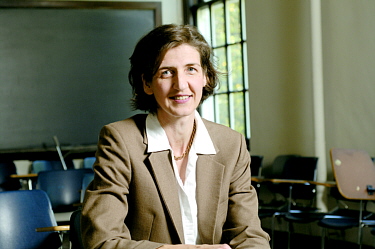
Claude Guillemard, Arts and
Sciences
Photo by Will Kirk / HIPS
|
Claude Guillemard, a senior lecturer of French in the
Department of German and Romance Languages and Literatures,
says she was really touched when she learned that she was
the co-winner of the Krieger School's Alumni Association
Excellence in Teaching Award. "It is so comforting to know
our students appreciate our efforts," Guillemard says. "It
makes it all worthwhile."
Guillemard offers a couple of theories
about what might make her stand out, but only after she's
pressed to do so. Mostly, she attributes her nomination not
to any intellectual quality but to some traits of her
personality well-suited to teaching.
"I think that I have a lot patience,"
she said. "That's not some skill I've developed —
it's just who I am."
Guillemard thinks her master's degree
in counseling also serves her well, helping her to be
empathetic with her students when they encounter problems
in their learning process, or even outside the classroom.
While she's understanding of the difficulties students may
have academically, socially and at home, Guillemard also
makes sure that her students are aware that she expects the
best from them all the time.
"I have high standards for myself and
also for my students," she said. "I'm going to give you my
best, but if you end up in my class, you're going to work,
too."
Guillemard admits that can be a tough
sell to undergraduates who are taking one of her
intermediate French classes just because they have to
fulfill a language requirement for their degree and not for
a love of the language. Those students can be especially
vulnerable, she says, but it's rewarding to get them hooked
despite themselves.
"With a foreign language, there is
something deeply personal involved in trying to express
yourself in a different code," Guillemard said. "You need
to accept that you don't have all the tools necessary to
say exactly what you wish to communicate."
That she is in tune with her students
is something her nominators noticed about Guillemard. A
colleague wrote that what impresses her about Guillemard is
"something in her that no one could easily imitate: her
warmth, her gift for putting students at ease immediately,
the way that — for all of her immense capacity for
painstaking work — she never seemed the least bit
hurried or preoccupied when talking to a student, or to
anyone else. There seemed to be something about talking to
Claude that made students — even shy students, or the
very weakest ones — suddenly relax and start speaking
better French."
Guillemard's student nominators noted
those qualities as well.
"Professor Guillemard has been not only
my favorite member of the faculty here at Hopkins; she has
totally changed my perspective of learning the French
language," wrote a freshman. "In high school, I dreaded
going to my French classes. However, here at Hopkins, my
French classes with Professor Guillemard have been the ones
that I enjoy the most. Thanks to her total commitment to
not only the French language but also to me, her student, I
have become confident with my understanding of the French
language."
— Amy Lunday

NITZE SCHOOL OF ADVANCED INTERNATIONAL
STUDIES
To be announced at the school's diploma ceremony.

PEABODY INSTITUTE
Boris Slutsky, piano faculty
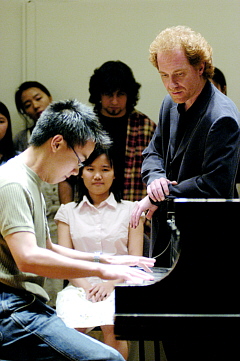
Boris Slutsky, Peabody
Photo by Will Kirk / HIPS
|
Moscow-born pianist Boris Slutsky blazed onto the
world music scene at the young age of 19. His studies with
Anna Kantor, alongside famed pianist and lifelong friend
Evgeny Kissin, prepared him to win numerous major
international competitions.
Now, he is teaching his students at
Peabody to be winners as well. At home and abroad, his
students are winning top honors, including Peabody's
Harrison Winter Concerto Competition, the Baltimore Music
Club Competition, the Hilton Head Piano Competition and the
Iowa Piano Competition. The upcoming William Kapell
International and the Queen Elizabeth competitions will
have representatives from Slutsky's studio as well.
Slutsky began his studies with Kantor
as a young boy at the Gnessin Institute for Gifted Children
in Moscow. In 1977, he left the Soviet Union with his
parents, who would eventually play violin and viola in the
Baltimore Symphony Orchestra. After completing bachelor's
and master's degrees at Manhattan School of Music, he
joined the Peabody faculty in 1993.
Kantor's influence on Slutsky is
evident in the comments from his students. As Kantor
balanced the individual needs of her pupils, so does
Slutsky. "I have ... progressed to a level of musical
maturity that allows me to form my own ideas and
communicate them," said one of his students in the Graduate
Performance Diploma program, which is designed for students
with exceptional artistic talent. Another GPD student
remarked, "He has the ability to adopt and communicate with
each individual student, which I find extremely valuable in
a teacher, as each and every one of us is different."
Slutsky has one of the largest and most
sought-after piano studios at Peabody, with more than 20
students. He balances his rigorous teaching schedule with
an active performance career. His orchestral, recital and
chamber performances have taken him worldwide with
appearances in major American venues such as Carnegie Hall
and the Kennedy Center, and abroad to France, Spain,
Belgium, Italy, Latin America and Asia. Although his busy
schedule is taking him to Korea during the commencement
ceremonies at Peabody, his students say they always feel
that he is "consistent with our lessons and makes every
effort to ... hear us 'one more time' before a big
performance or competition."
Dedication and effort from his students
inspire Slutsky as well. "The most important factor in my
enjoyment of teaching is curiosity," he said. "I like to
see students who are curious about different kinds of
music, different ways of looking at things. I want someone
who has initiative, who does not wait to hear what to do
but presents me with their own visions, their own ways of
hearing things. I love teaching as much as anything else."
— Kirsten Lavin

SCHOOL OF EDUCATION
Michael Houck, Public Safety Leadership
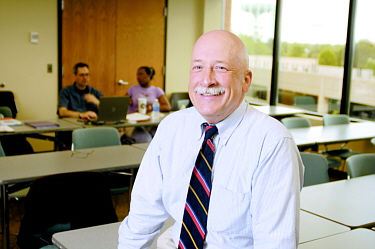
Michael Houck,
Education
Photo by Will Kirk / HIPS
|
When it comes to the fine art of research, Mike Houck
is "Mr. Librarian" for both the Carey Business School and
the School of Education. What many of his in-house clients
don't realize, however, is that Houck also uses that
expertise as a veteran instructor for Education's Division
of Public Safety Leadership.
Working out of Johns Hopkins' Columbia
Center, Houck has the official title of "regional campus
librarian." In that capacity, he answers the research and
information needs of students, faculty and staff of both
schools, a job he has been doing at Hopkins for 11 years.
Houck, who has a master's in library science from Catholic
University (in addition to two other master's degrees),
guides his clients through the maze of online and
on-the-shelf journals, databases, periodicals and other
sources of information available to them through the vast
offerings of the various Hopkins libraries. The amount of
information available is staggering — "there are tens
of thousands of electronic journals alone available," he
said — and the levels of comfort and expertise
demonstrated by users accessing this information varies
considerably. Houck also identifies and locates hard copies
of books and other texts for delivery to his customers.
"I come at it from a business
perspective," Houck said. "We have fine resources to offer,
but [due to the amount and complexity of the material],
it's not an intuitive thing for most people to access.
That's why I work one-on-one in addition to working with
groups. I learn people's specific needs, time constraints
and whether the need for information is immediate or will
be more useful down the line."
Today's students, Houck says, need a
different skill set to conduct research than their
predecessors did. "The irony with so much information
available is that it can be overwhelming. Students have to
be editors to weed through a mountain of information to
find what they actually need," he said.
Houck sees working in his virtual
library and the explosion of information available via the
Internet as a "sea change analogous to Gutenberg and
movable type. It's just my good luck to be doing this
exciting work now."
Houck started his teaching career with
the Division of Public Safety Leadership almost by
accident, "pinch-hitting" for a colleague for one class and
"never leaving." He teaches Information Sources in the
Social Sciences, as well as a one-day workshop, to the
division's police, fire and emergency medical services
personnel, introducing basic tools of the trade and a
research system his students can apply to their schoolwork,
career and personal pursuits.
Some of his students, such as those in
investigatory areas, are "natural detectives" who can
"comfortably rummage around" online sources of information,
Houck says; others, "not as much." Houck makes a fitting
analogy of his students visiting a pistol range: Some are
"natural shots," while others need further practice. "I
want to give all of them a skill set to last them for their
careers," he said.
Doug Ward, director of the Division of
Public Safety Leadership, said, "When it is difficult to
locate a badly needed reference, Mike is the greatest
friend a student or faculty member can have. I see him
regularly carrying large piles of books and articles for
delivery to our students. Mike truly goes above and beyond
what is expected from any librarian. All of our students
and faculty are very appreciative of his excellent work."
— Andrew Blumberg
Carl Herbert, Teacher Development and Leadership
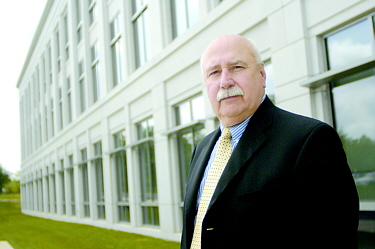
Carl Herbert, Education
Photo by Will Kirk / HIPS
|
Retirement" is a relative term — just look at
the distinguished career of Carl Edward Herbert.
After a 34-year career in public education, which
began in 1968 and concluded in 2002, Herbert still is going
strong, teaching six courses for the School of Education's
Department of Teacher Development and Leadership, as well
as serving as adviser for the master's degree in education.
Altogether, he now counts a full decade of teaching at
Hopkins.
Herbert, who received a master's degree
in school administration and supervision from George
Washington University, began his career as an elementary
school teacher in Prince George's County, Maryland, and
quickly became interested in the field of gifted education,
serving those students with exceptional talents and
learning potential. "I realized that there was very clearly
a discrepancy between the performance of some academically
talented students and the curriculum available to them," he
said. It led, he adds, "to a very defining decision"
regarding his life's work.
Herbert continued his career in both
the Prince George's and Calvert County public school
systems, becoming an administrator working with principals
and teachers on curriculum and classroom management,
long-range planning and instructional strategies, among
other areas. During this time, the U.S. Office of Education
created the National State Leadership Training Institute,
which focused on field sites across the country dealing
with developing programs for gifted learners. Herbert was
asked by Prince George's County officials to participate in
the county component of the program.
His growing expertise in gifted
education was soon to be repeatedly tapped. From 1987 to
1994, Herbert held several key positions in the Maryland
State Department of Education, including staff specialist
in gifted education, chief of the School Improvement and
Program Enrichment Section and senior state specialist in
gifted education. Most recently, he served as coordinator
for gifted and talented education for the Frederick County
public schools system, and in several other leadership
roles associated with gifted education.
"Only in the last several decades has
there been a sustained interest in looking at high-ability
learners — a pronounced emphasis," he observed.
For the School of Education, Herbert,
who co-developed the Gifted Education Certificate Program,
teaches the Gifted Learner; Curriculum, Instruction and
Assessment of Gifted Learners (Parts I and II); Seminar in
Gifted Education; Practicum in Gifted Education; and
Curriculum Theory, Development and Implementation.
Herbert freely shares his enthusiasm
for his students. "They're a small, clearly defined
population of educators who have a commitment to improving
student performance," he said. "It's a wonderful group to
work with. They have consciously and deliberately decided
to pursue additional studies in the area of gifted
education, and they're very committed."
His colleagues and students recognize
his commitment to the field as well. "Carl is a selfless
team player who has a terrific sense of humor and is simply
a wonderful person to work with," said Edward Pajak,
professor and chair of the Department of Teacher
Development and Leadership. "His course evaluations are
consistently among the strongest in the department. As one
of his students recently noted, 'Carl is by far the best
teacher I have had in my undergrad or graduate level
classes.'" — Andrew Blumberg

SCHOOL OF MEDICINE
Samuel Durso, Geriatric Medicine and Gerontology
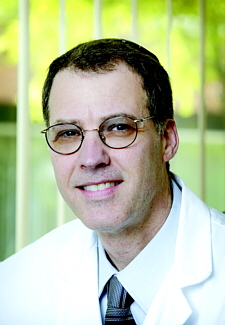
Samuel Durso, Medicine
Photo by Will Kirk / HIPS
|
Colleagues say that Samuel Durso's teaching strengths
are his low-key and direct approach. Durso, a pioneer in
geriatric medical education, is also the ideal mentor, they
say, a thoughtful and insightful professional who shines in
one-on-one situations.
"He includes [students] directly in his
patient care and excels in bedside teaching," said William
Greenough, professor of geriatric medicine at the School of
Medicine. "He has a good sense of humor, but he's not a
performer or flashy. His is a quiet approach."
Durso joined Johns Hopkins in 1995 to
become medical director at the newly constructed Oak Crest
Village Retirement Community. He joined the full-time
faculty at the School of Medicine in 2002 as an assistant
professor and was promoted to associate professor in 2003.
He is currently an attending physician at the Bayview
Medical Center and The Johns Hopkins Hospital, and the
clinical director of Geriatric Medicine and director of
education for the Division of Geriatric Medicine and
Gerontology at the School of Medicine.
Durso's academic interest is education,
and he serves as editor for the "Teaching in the Community"
column in the journal Advanced Studies in Medicine. He is
also the author of Teaching Ambulatory Medicine: Moving
Medical Education Into the Office (Johns Hopkins University
Press, 2002).
Greenough said that Durso has played a
pivotal role in making Johns Hopkins a leader in geriatric
education through his development of the school's
curriculum in this growing field.
"He's done a great deal in terms of
making students recognize early on in their education the
importance of taking care of older people, who often deal
with complicated, multiple illnesses," Greenough said.
Durso said that caring for such
patients requires a high degree of medical judgment, which
he tries to impart to all his learners.
"Teaching this judgment is challenging,
rewarding and, I feel, highly needed," Durso said.
His overriding teaching philosophy, he
said, is to constantly challenge students to solve problems
and use their critical thinking skills. He makes them
repeatedly practice physical diagnosis, which he observes
and follows with very detailed and timely feedback.
His reward, he said, is the steady
maturation of the students.
"I like seeing them grow intellectually
and professionally," he said. "I also really enjoy seeing
people who enjoy their profession as much as the people
here do."
His primary teaching responsibilities
are as a member of the faculty for the Osler Service and
the interdisciplinary geriatric team at The Johns Hopkins
Hospital. He also teaches in the Geriatric Fellowship
Program and the Department of Medicine at Bayview.
Linda Fried, director of the Division
of Geriatric Medicine and Gerontology in the School of
Medicine, said that Durso has been a leader both in title
and substance. Fried, who nominated Durso for the
Excellence in Teaching Award, described him as a remarkably
thoughtful and idealistic teacher who inspires students and
faculty alike.
"He is an outstanding clinician and a
wonderful role model," she said. "It is important for young
doctors to learn how to better care for a population that
is aging so dramatically. He uses very innovative
approaches to help those here understand the difference in
care needed when dealing with older patients, and how to
analyze their needs and optimize the person's
well-being."
When asked to describe Durso's teaching
approach, Fried said, simply, "understated."
"He doesn't do any arm twisting," she
said. "He leads by his compelling nature and his concern
for the learner. He cares a lot about his students, and I
think they know that. In reality, it's inspiring for all of
us to have someone like this around, a clinician's
clinician who is caring, compassionate and extremely
dedicated." — Greg Rienzi

SCHOOL OF NURSING
Janice Hoffman, baccalaureate level
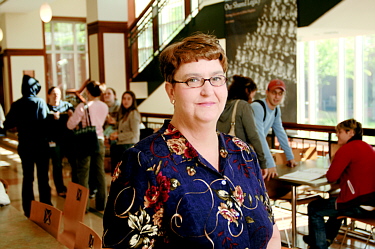
Janice Hoffman, Nursing
Photo by Will Kirk / HIPS
|
Janice Hoffman, to me, is the ultimate teacher," raved
one graduating student at the School of Nursing. "I only
wish that she could teach every class." Two years after
joining the school's full-time faculty, Janice Hoffman has
won the hearts and minds of baccalaureate students
throughout the school — and the 2007 Excellence in
Teaching Award.
Her achievement stems from her devotion
to nursing education, which is the focus of her research
and her area of expertise. "I love teaching and mentoring
senior nursing students and new nurses in their first few
years of practice," Hoffman said. "My responsibility to my
students is more than disseminating the factual content of
the course. It is to teach critical thinking and mentor
young nurses to develop a method of inquiry."
Throughout her 28 years of nursing,
Hoffman has seemed destined for nursing education.
Her first seven years were spent on
active duty with the U.S. Navy, where she was initially
assigned to train navy corpsmen but went on to be
responsible for staff development of physicians, nurses and
support personal. When applying for a nursing position at
Sentara Norfolk General Hospital, she was hired instead to
teach in its nursing diploma program. At North Arundel
Hospital, after interviewing for a supervisory position,
she ended up assisting with the staff education program for
newly graduated nurses.
In 2001, while working on her
doctorate, she joined The Johns Hopkins Hospital as
director of a program called SPRING — for Social and
Professional Reality Integration for Nurse Graduates
— to help new nurses transition to nursing practice.
With some advice and nudging from mentors and colleagues,
she joined the School of Nursing faculty in 2005.
Her master's degree, received in 1988,
is in the field of nursing education, and her doctoral
dissertation was titled "Predictors of Critical Thinking in
Baccalaureate Nursing Students."
According to Hoffman, being on the
faculty is a perfect fit for her professional interests and
skills. "There's a little entertainer in me," she admitted.
"And teaching also forces me to go to a new level of
understanding so I can explain it to my students. I love
that learning process. Where else do you get paid to read
and keep up with what's going on in your practice?"
Hoffman's Adult Physical Health course
is organized as a series of case studies in which students
are expected to make correlations between the patient's
diagnosis and the nurse's observations. "I want them to
know not only what to do but why," Hoffman said.
"Baccalaureate nurses need to develop their critical
thinking skills. I teach them that it's OK to say 'I don't
know' and look things up instead of just doing what they
are ordered."
Her case studies are made more
compelling by the fact that she continues to work at the
hospital a couple of days a month. "It keeps me fresh, and
I maintain my credibility with the students. Just because a
nurse gets a higher education doesn't mean she has to leave
the bedside."
Students are drawn not only to
Hoffman's deep knowledge of the subject matter and her
skill at teaching, they are also impressed with her
devotion to her students. Each academic year, she sees 300
new faces and does her best to learn as many names as she
can.
"Dr. Hoffman puts a lot of time and
effort into the school and students, and I believe it is
time she is recognized for it," one student wrote. "She is
more than a teacher — she is a mentor, a counselor
and a friend." — Kelly Brooks-Staub
Cynda Rushton, graduate level
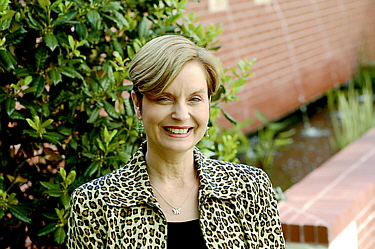
Cynda Rushton, Nursing
Photo by Will Kirk / HIPS
|
When I teach a class, I begin by assuming that the
wisdom is already in the students in my classroom. My job
is to facilitate that wisdom coming forward," said Cynda
Rushton, an associate professor at the School of Nursing.
"I coach them in discovering, learning and recognizing what
they already know."
A nationally recognized expert in
bioethics and palliative care, Rushton has coordinated the
school's course in health care ethics since 1995. All
graduate nursing students are required to take the course
Philosophical, Theoretical and Ethical Basis for Nursing,
in which Rushton strives to impart the skills required to
deal with unique ethical issues that arise in nursing
practice.
"I love teaching graduate students,"
Rushton said. "Many of them have chosen to come back to
school at a major turning point in their careers. Some
haven't developed the skill to articulate or defend their
sense of right and wrong, and [they] go through their daily
work routines carrying that burden. Teaching the ethics
course is an incredible opportunity to help practicing
nurses reinvigorate their commitment to patients, families,
the profession and to themselves. It has the potential to
help them fulfill their promise as a nurse."
Rushton makes her classes very
experiential, based on class dialogue. Using a variety of
theories and principles, students learn to analyze ethical
issues, understand various positions and their
justification, and expand their repertoire of tools to
advocate effectively. The students facilitate discussion on
topics such as informed consent, confidentiality, genetics,
advocacy, professionalism, social justice and more.
According to Rushton, "Not much is off-limits! I invite
them to take time to think about what they really believe
and find their voice. I try to give them different ways to
think about what to do in difficult situations."
It is because she sets compelling
intellectual challenges for her students that Rushton won
this year's Excellence in Teaching Award. According to
nominating students, her teaching often helps students
change their point of view. "Her presentations of cases and
thorough processes involving ethics often made me see the
case in another light," wrote one.
Rushton was instrumental in creating
the first pediatric palliative care program in Maryland:
the Harriet Lane Compassionate Care Program of the Johns
Hopkins Children's Center. She has served as program
director since 2000, working closely with other team
members to create a 70-member interdisciplinary palliative
care network, establish innovative educational programs,
create a comprehensive bereavement program for families and
health care professionals and develop support systems for
health care professionals who care for these children.
Rushton is engaged in quality
improvement initiatives, research involving issues of trust
and betrayal, caregiver suffering, end-of-life
communication and educational models. Throughout her
career, she has participated in national initiatives,
delivered testimony to Congress and collaborated with
professional organizations to create better systems of
pediatric palliative care and to see her vision for
improving care at the end of life become a reality. She has
received multiple awards and recognition for her work,
including being selected as one of 20 Robert Wood Johnson
Nurse Executive Fellows in 2006.
"There's always a group of students who
are on fire at the end of the semester," Rushton said. "The
subject of nursing ethics just resonates with them. They go
back to their nursing practice recommitted to making a
difference. For me, that is what makes teaching such great
fun."
— Kelly Brooks-Staub

WHITING SCHOOL OF ENGINEERING
Hedy Alavi, Geography and Environmental
Engineering
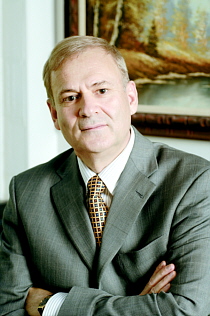
Hedy Alavi, Engineering
Photo by Will Kirk / HIPS
|
When the subject is teaching skills, Hedy Alavi gets
high marks from the undergraduate and graduate students he
instructs and from his colleagues in the Whiting School's
Department of Geography and Environmental Engineering.
They point to the field trips he
arranges to show how textbook theories work in real-world
environmental applications. They also mention the extra
attention and encouragement he provides to students who
need help with the demanding curriculum.
Alavi's efforts received even wider
recognition recently when he was named this year's
recipient of the Johns Hopkins Alumni Association
Excellence in Teaching Award.
"Dr. Alavi's teaching style is
challenging, entertaining, engaging," wrote one student in
a letter of support. "Above all, you leave each class
looking forward to the next week. If there is any professor
deserving of this award, Dr. Alavi is it."
Another student described Alavi as
"very accessible and helpful." When the class was assigned
to prepare reports, the student recalled, Alavi opened his
personal library as an additional source of material.
Several alumni and faculty colleagues
also submitted letters of endorsement for Alavi's teaching
award.
"A more dedicated instructor you cannot
find," one professor wrote. "Students in his class
practically worship him. He conveys a dizzying array of
breadth in his course Introduction to Environmental
Engineering without sacrificing depth and key fundamentals.
He also provides an education in engineering practice
through his engagement of students in field trips and team
projects. You hear their appreciation of him every time
they mention his name."
Alavi responds humbly to the
recognition. "I'm not doing anything unusual," he said.
"I'm just an average instructor. I was truly honored to be
mentioned with the other faculty members who were also
nominated."
Before joining the Johns Hopkins
faculty in 1996, Alavi, an expert in hazardous and solid
waste engineering, was a Maryland Department of the
Environment administrator.
Today, he wears several hats within the
Whiting School. He chairs the graduate Environmental
Engineering, Science and Management Program in the school's
Engineering and Applied Science Programs for Professionals.
He also serves as assistant to the dean for international
programs, helping the school establish research and
academic collaborations with universities and industries in
other nations.
But his work directly with students
remains a top priority. "I try to devote individual
attention to the students and not just consider them as a
class," Alavi said. "When my students miss classes or I
notice that they're not doing well in their homework, I'll
call them into my office and encourage them to work harder
and catch up."
Alavi plans to demonstrate his own
dedication to environmental awareness. He said he will
donate the monetary prize that comes with his teaching
award to the "green roof" project under way on the Homewood
campus. — Phil Sneiderman
 GO TO MAY 14, 2007
TABLE OF CONTENTS.
GO TO MAY 14, 2007
TABLE OF CONTENTS.
 GO TO THE GAZETTE
FRONT PAGE.
GO TO THE GAZETTE
FRONT PAGE.
|